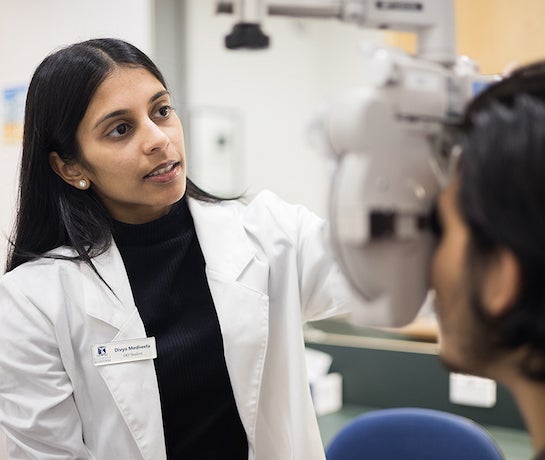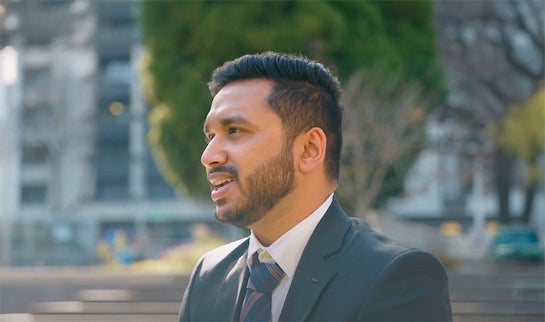- Duration 24 months
part time - Subjects 12 subjects
(150 credit points) - Fees $4,500 per 12.5
credit point subject - Intakes January, March, May, July, August, October
- Mode (Location) Online Mixed-mode (Parkville)
Why study the Master of Public Health online with the University of Melbourne?
Become a public health expert through research-led theory and practice
Our course is built on cutting-edge research and insights from top academics and clinical experts, ensuring students learn from leaders in their fields. It offers a rigorous foundation in public health theory and practice through up to six multidisciplinary subjects, essential for all areas of public health.
Learn from leaders in public health at Australia's #1 University1
Our experienced faculty are leaders in the field. Students benefit from their contemporary research and practical insights gained from real-world health sector experience. Students will gain a recognised qualification from Australia's top university.
1QS World University Rankings 2026
You're in control of your learning
Wherever you are, you can take charge of your learning experience. Whether this means engaging live or when it suits you, taking breaks or accelerating, connecting with others or running your own race, you're in control – of your work, study and life.
Course highlights
- Lead initiatives to drive health system transformation
- Embrace advanced technologies to enhance patient outcomes for more equitable and sustainable healthcare
- Develop innovative health solutions supported by cutting-edge research
- Advocate for and influence public health through strategies, policies and solutions.
Learn from world-leading academics
Benefit from expert-led contemporary learning as you prepare for the next phase of your career. Engage with our world-leading academics whose expert opinions are sought after by government, shaping strategy and influencing policy.
Unlock exclusive access to the latest industry research from our world-class experts to amplify your impact in public health.
Download your course guide to meet the team responsible for the Master of Public Health course at Australia’s #1 university (QS World University Rankings 2026).
Career outcomes
Make your mark on a growing field that changes lives every day. The health workforce represents around 5% of Australia’s total employed workforce, growing by 37% between 2013 and 20222.
Experience an immediate and long-lasting impact on your career, with 40% of the curriculum dedicated to electives to give you the flexibility to align your course with your career goals.
This transformative qualification will help prepare you for a variety of roles, such as:
- Health Education and Development Leader
- Nursing Director/Team Lead
- Health Director
- Public Health Researcher
- NGO Manager
- Policy Adviser
- Government Adviser
- Industry/Professional Association Adviser.
Elective streams
With a choice of three key areas of public health, you have the opportunity to evolve your health career. Drive transformation as a leader, advocate for economic equality or effectively respond to challenges across public health and its policies. You will study compulsory subjects related to your focus area, plus up to four electives to expand your knowledge.
Grow your knowledge in the specific public health practice areas that align with your career aspirations.
Experience an immediate and long-lasting impact on your career by acquiring valuable knowledge in public health. With 40% of the curriculum dedicated to electives, you have the flexibility to select the areas of public health that align with your career goals.
Subjects
Core:
- Foundations of Public Health
- Epidemiology 1
- Biostatistics
- Applied Program Development
- Qualitative Research in Public Health
- Public Health Leadership and Policy
Plus:
- Public Health Project (25CP)
- Four Electives.
Electives:
- Practice of Public Health Leadership
- Health System Transformation
- Health Economics 1
- Introduction to Economic Evaluation
- Comparative Health Systems
- Health Program Evaluation 1
- Regression Methods in Health Research
- Advancing Health Equity
- Health Policy.
arrow_right_alt Download your course guide for more information
Inspire and lead positive change in health.
Gain the confidence to effectively anticipate, identify, navigate, and respond to the ever-changing health landscape. With a strong emphasis on program development, you will be well-prepared to step into senior leadership roles within the public health workforce.
Subjects
Core:
- Foundations of Public Health
- Epidemiology 1
- Biostatistics
- Applied Program Development
- Qualitative Research in Public Health
- Public Health Leadership and Policy.
Plus:
- Health System Transformation
- Comparative Health Systems
- Public Health Project (25CP)
- Two electives.
Electives:
- Practice of Public Health Leadership
- Health Economics 1
- Introduction to Economic Evaluation
- Health Program Evaluation 1
- Regression Methods in Health Research
- Advancing Health Equity
- Health Policy.
arrow_right_alt Download your course guide for more information
Promote health equity with specialist skills in health economics.
Gain a broad understanding of economic evaluation in the health sector, focusing on key methodologies, study designs, and important topics like distributional cost-effectiveness, to address health inequalities. Advocate for equitable healthcare access by using frameworks that guide resource allocation, aligning with societal needs and tackling current and future healthcare demands.
Subjects
Core:
- Foundations of Public Health
- Epidemiology 1
- Biostatistics
- Applied Program Development
- Qualitative Research in Public Health
- Public Health Leadership and Policy.
Plus:
- Health Economics 1
- Introduction to Economic Evaluation
- Public Health Project (25CP)
- Two electives.
Electives:
- Practice of Public Health Leadership
- Health System Transformation
- Comparative Health Systems
- Health Program Evaluation 1
- Regression Methods in Health Research
- Advancing Health Equity
- Health Policy.
arrow_right_alt Download your course guide for more information
Subjects of study
The Master of Public Health online from the University of Melbourne is a transformational qualification designed to equip health professionals to drive system transformation, develop innovative solutions and influence health policy.
arrow_right_alt Download your course guide for more information
Explore the determinants of health at individual, group, and population levels, with a focus on the health of Indigenous peoples in Australia and worldwide, as well as ethical frameworks that underpin public health practice.
Learn to conduct comprehensive health needs assessments for effective strategic planning and apply these methodologies to real-world scenarios through case studies.
Develop the knowledge and skills to analyse patterns and trends in disease occurrence across and within populations, design studies that effectively minimise bias, and understand the key characteristics of major sources of morbidity.
Explore the core principles of statistics, discovering essential tools for conducting basic statistical analyses on public health data sets and confidently interpreting research findings within a public health context.
Explore theories and models of public health leadership and project management and gain practical skills related to critical public health initiatives, including those focused on Indigenous health.
Explore qualitative research in public health, including research design and qualitative methodologies, equipping you to design, plan, and critically evaluate this powerful tool to inform and enhance public health practices.
Explore the distinctive challenges of managing public health initiatives and the influence of politics, media, and community, and how to navigate these factors.
Learn about the integration of equitable co-design practices and the measurement of outcomes across governance, financing, workforce planning, and digital health.
Explore economics, microeconomics, and welfare economics, examining the drivers of healthcare demand, the production and supply of health services, the economics of the health workforce, and the government's role in healthcare.
Explore the principles, key concepts, and methodologies of economic evaluation within public health and healthcare contexts, including methods to address inequalities and extend benefit evaluation.
Critically analyse and compare health systems across countries with varying socio-economic contexts using the latest research and real-world examples from Australia, the Asia-Pacific region, and beyond.
Examine the three primary stages of evaluation, equipping you with the tools to develop a thorough evaluation plan for a work-based health program.
Learn to apply linear and logistic regression techniques to analyse both continuous and binary outcome variables using the statistical software Stata.
Examine the root causes of inequities and how systemic barriers deepen disparities and lead to poor public health outcomes, and identify pathways and strategies to achieve meaningful and responsive change.
Examine the nature of health policy, types of policy instruments, and the processes of policymaking, including agenda-setting and evidence-based decision-making.
Conduct an independent research project, including literature review, research methodology and necessary activities to address the question.
You’re in control of your learning experience
- Choose how and where you study, with the ability to learn in real time or on demand
- Have more control over your learning with the ability to take breaks from study when needed
- Receive ongoing one-on-one support from application through to graduation
- Access resources and support systems designed to help you succeed
- Experience personalised interactions from expert educators who value your development
- Gain a competitive edge with a recognised qualification from Australia’s top university (QS, 2026).
Find out more about the online experience at the University of Melbourne.
Entry requirements
To be considered for entry into this course, you must have completed one of the following degrees with a weighted average mark of at least 65%:
- An undergraduate degree in public health or
- An undergraduate degree and at least two years appropriate full-time work experience (or equivalent) in a public health setting including work activities focused on health policy, health economics, health planning, epidemiology research, and more or
- An undergraduate degree and at least two years appropriate full-time work experience (or equivalent) in a professional healthcare setting including medical, nursing, AHPRA-registered allied health professional degrees (eg physiotherapist, pharmacist, chiropractor) or
- A masters degree (by research or coursework) or PhD in health or public health including medical degree, nursing degree, and AHPRA-registered allied health professional degrees.
arrow_right_alt Download your course guide for more information
Fees and FEE-HELP
Cost per 12.5 credit point subject: $4,500*
FEE-HELP is a loan that can cover all or part of your tuition fees. The Australian Government pays the amount of the loan directly to the University. It enables you to borrow the amount of your tuition fees and then repay the loan once you are in the workforce and earning at a specified level, or you can make voluntary repayments to the ATO at any time.
For more information, including eligibility for FEE-HELP, download your Master of Public Health course guide.
* Fees are subject to annual review by the university, with any new rates effective from the beginning of each calendar year.
Suraj's story
“The skills and exposure that I got during my study really helped me to stand where I am right now.”
Suraj
Master of Public Health Alum
Enquire and receive your course guide
Discover more information on our courses, including:
- Entry requirements
- Career outcomes
- Subject descriptions
- Fees and FEE-HELP.
Explore related courses on campus
Prefer face-to-face learning, or looking to apply as an international student? Discover a range of mixed-mode courses available in your area of interest.
Frequently asked questions
Yes, a masters in public health is often worthwhile for health professionals looking to expand their impact and address real-world health challenges. A postgraduate qualification in public health can strengthen your ability to influence policy and lead initiatives that improve population outcomes.
A master of public health degree is a strategic investment in career growth. For example, the University of Melbourne’s online Master of Public Health outlines potential career pathways to management and leadership positions, including, Health Director, Policy Adviser or Nursing Director.
Most masters degrees in public health take 18-24 months full time to complete. Part time and online options are also available, with many courses, such as the University of Melbourne’s online Master of Public Health, which can be completed in as little as 24 months part time.
This flexible online course allows students to balance study with work and personal commitments. The format enables you to apply skills, such as data analysis and policy development, immediately in your current role.
Salaries in public health can vary based on factors such as role, organisation, and experience. Master of public health graduates may step into senior roles such as Health Director, Government Adviser, NGO Manager, or Nursing Director, where salaries often reflect the responsibility and impact of these positions. For example, the typical salary of a Nursing Director in Australia was $160,000 in December 2025, according to statistics from Seek.com.au. Completing a postgraduate qualification can help you reach and excel in these high-impact roles.
No, this course is only available to domestic students in Australia. If you are an international student and would like to study this course, please visit our mixed-mode Master of Public Health page.
You’ll find that many students are drawn to fields like general public health, health economics, health promotion, epidemiology, biostatistics and health policy. These streams offer strong career pathways and the chance to make a meaningful impact on communities and health systems.
By choosing a master of public health degree that offers elective streams, you’ll be able to explore various focus areas and tailor your studies to align with your passions.
.




